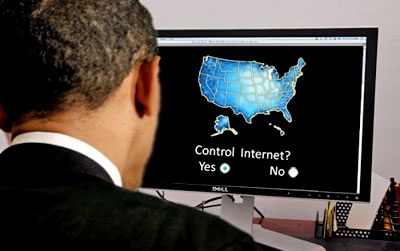
by Paul Joseph Watson
February 15, 2012
from
PrisonPlanet Website
The much feared
Obama Internet ‘kill switch’ has been dropped from the
latest incarnation of the cybersecurity bill which was introduced yesterday,
but the White House still claims that it can intervene in the world wide web
under the 1934 law that created the Federal Communications Commission.

“Public apprehension about the possibility
of handing the White House a “kill switch” for the Internet has dogged
the cybersecurity debate, fueled by a proposal that would have codified
emergency powers for the president in the event of a catastrophic
attack,”
reports the Hill.
Indeed, cybersecurity advocate Joe Lieberman
ominously pushed for the ‘kill switch’ provision to be included in the bill
by citing the Chinese system of Internet policing as a model to which the
United States should aspire:
As we
have documented, China routinely censors
the Internet and cuts off access in order to hide evidence of government
corruption and to cover up atrocities committed by the state.
Although language allowing the President to flip a figurative kill switch to
shut down parts of the Internet is gone, the White House still claims that
it already retains such powers under the law that created the
Federal
Communications Commission in 1934.
This law states that if a,
“state of
public peril or disaster or other national emergency” exists, the president
may “authorize the use or control of any…station or device.”
Despite the more controversial aspects having disappeared from the bill, it
still contains plenty of provisions that represent a sweeping power grab on
behalf of the federal government.
One such provision would empower the Department of Homeland Security to
conduct “risk assessments” of private companies in certain sectors and force
them to comply with expensive mandates to secure their systems.
Despite the Internet kill switch provision being dropped from the bill, the
web as a whole still faces innumerable threats to the anonymity, privacy and
freedom of speech of those who use it.
Despite the recent defeat of
SOPA and PIPA, protests over
governments
signing up for ACTA, a global treaty that grants copyright holders sweeping
direct powers to demand ISPs remove material from the Internet on a whim,
have swept Europe.

